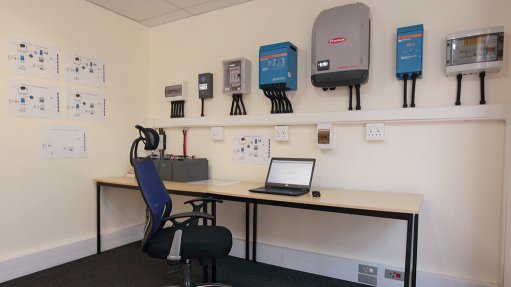
An incorrectly installed solar power system lowers efficiency, reduces equipment life, affects connected appliances, and worst case: presents a fire risk.
KJION Energy SA, a subsidiary of ICT Group Holdings and provider of solar photovoltaic solutions for home and industrial use, has set up a training and demonstration facility with a range of solar options. "The idea is to cover all aspects of the products available in the market and provide training to ensure correct installations" says Johann Wassermann, Sales and Marketing Manager at KJION Energy SA.
As with any electrical installation, a solar power system should be inspected and the owner should be issued a certificate of compliance, either by the installer or by an independent electrician. "Power surges, lightning strikes, short-circuits and reduced product lifespan are some of the risks of a faulty installation" says Wassermann.
"Then there's the risk of insurance companies refusing to pay out." Power surges and short-circuits will damage appliances if surge arresters have not been properly installed, potentially melting cables and posing a fire risk. "DC power is dangerous. Aside from possible insurance issues, it's a powerful force. If you place a spanner across both battery terminals, it'll melt a spanner - that's some energy. These are extreme examples though, and from an efficiency perspective, it's important to start off with a well-considered design."
In an effort to cut costs, installers may create a system which is insufficient for a home or business' needs. "A customer's load consumption must be considered when creating a design" he says. "During our training, we touch on every aspect, from design to final installation, with focus on cost and efficiency.
For example, if the solar panel plant is too small to charge the battery bank fully, you could cycle the batteries in way that affects them negatively. Surprisingly, it's the batteries which are the most expensive items, so it's important to be well-informed." Wassermann recommends choosing an installer that belongs to the Sustainable Energy Society of Southern Africa (SESSA), to ensure not only credibility, but this also allows for recourse in case of problems. "It's also a good idea to have an external installer or electrician check the system for compliance and suitability."
"Our demo and training set-up allows us to simulate a range of different scenarios, such as DC-coupled, AC-coupled and grid-tide solutions. We're able to tailor our training to a specific audience, be it installers, insurance assessors or electricians providing compliance certificates. Our configuration is also ideal to showcase our offerings " he says. Solar panels on the roof at KJION's offices in Centurion are linked up to several possible AC or DC (or both) inverters, chargers and deep-cycle batteries to demonstrate various products and options and to provide installation and product training.